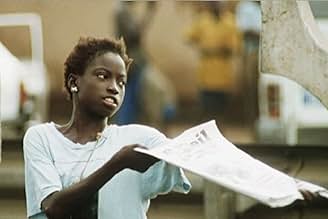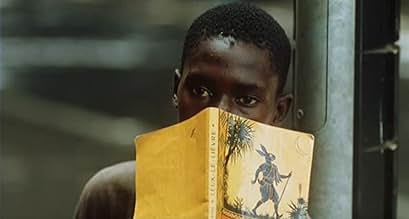IMDb RATING
7.3/10
994
YOUR RATING
A girl sells copies of Soleil, the government paper.A girl sells copies of Soleil, the government paper.A girl sells copies of Soleil, the government paper.
- Awards
- 9 wins & 2 nominations total
- Director
- Writer
- All cast & crew
- Production, box office & more at IMDbPro
7.3994
1
2
3
4
5
6
7
8
9
10
Featured reviews
Altruism?
Great movie, hard for me to watch as a pampered American.
Sili seems to live the impossible - she makes her money then seems to pass out that money to not only her Grandmother, but everyone nearby. There is no way to tell if these people are family or simply neighbors.
I have some health problems. When Sili is knocked over by the boys, and one of her crutches falls in the water, the camera pans to Sili's electric smile. She is smiling at the thought of her friend jumping in the water to get her crutch, not thinking about the evil boys that just tried to harm her.
It is a smile that I want to cultivate for myself. The smile was insane in its origin, it came from inside the girl, not from her circumstance. I want to be that kind of insane. I want to smile on my worst days like I don't have a care in the world.
Sili seems to live the impossible - she makes her money then seems to pass out that money to not only her Grandmother, but everyone nearby. There is no way to tell if these people are family or simply neighbors.
I have some health problems. When Sili is knocked over by the boys, and one of her crutches falls in the water, the camera pans to Sili's electric smile. She is smiling at the thought of her friend jumping in the water to get her crutch, not thinking about the evil boys that just tried to harm her.
It is a smile that I want to cultivate for myself. The smile was insane in its origin, it came from inside the girl, not from her circumstance. I want to be that kind of insane. I want to smile on my worst days like I don't have a care in the world.
A delightful portrait of the streetlife in Dakar
Being a poor and handicapped girl in a large West-African city guarantees a life full of hardship. But Sili is determined to take her fate into her own hands. She stops begging and starts to sell the newspaper 'le Soleil'. Although healthy boys dominate this business, she is immediately successful.
The atmosphere of the movie is slightly naïve; Sili successful stands up to policemen and even frees a woman who was imprisoned innocently. Although a bit fairytale-like, the girl Sili is indeed a worthy tribute to the street children of Dakar.
The atmosphere of the movie is slightly naïve; Sili successful stands up to policemen and even frees a woman who was imprisoned innocently. Although a bit fairytale-like, the girl Sili is indeed a worthy tribute to the street children of Dakar.
It's short, cute and straight to the point without too much fuss.
Sili, a young teenage street kid, decides to hit the streets and sell newspapers to make ends meet. The other newspaper boys don't like her moving on their territory and give her a hard time. This is an observing piece on street life poverty.
The Little Films That Could
Le Franc (1994) & The Little Girl Who Sold The Sun (1999) are the first two entries in late Senegalese director Mambéty's whimsical yet very socially relevant trilogy of films titled "Tales of Ordinary People". What a great loss, then, that the aeuteur's inopportune death in 1998 meant that they were also the only two entries in an unfortunately unfinished trilogy.
Both films are relatively short feature films, clocking in at about 45 minutes each. Similar in their inspiring messages, light satirical approach, and allegorically important commentary, there is little doubt that the planned third and final installment would have followed in the same vein and been as successful.
Like the director's feature films, they include impressive performances by non professional actors and actresses, and the parables are accompanied by catchy, engaging soundtracks that exhibit the culturally unique sounds of African music. Le Franc in particular makes good use of the congoma, a little known unique looking instrument most similar to a guitar. Not to be outdone, The Little Girl Who Sold The Sun features an irresistible scene with our young heroine wearing adorable yellow plastic sunglasses, grooving and singing along to a radio tune that the local street children pay a boy in a wheelchair to play for them. Indeed, there are several parts in these films that could easily be confused for quality music videos!
The most notable shortcoming is the length of these films, leaving much to audience imagination and not having quite enough time to fully develop character arcs. There is also a slight disconnect in their presentation as both mini fairy tales and as allegories that should convey cultural, social, and political commentary. In Le Franc, the protagonist's decisions are foolish, frustrating, and difficult to believe. In The Little Girl Who Sold The Sun, the protagonist is a zesty combination of Helen Keller's perseverance in the face of disability and marginalization, Mother Teresa's charitable ways, and Pollyanna's undeterrable optimism. While the former short film is more comical in its little-guy-who-overcomes-the-odds-in-the-name-of-music tale, the latter is more inspirational in its little-girl-who-overcomes-the-bigger-boys-despite-her-handicap tale. The narrative would have been more effective if it came across as more plausible and sincere. One example of this unrealistic storytelling is showing a sexist police sergeant accusing her of theft with nothing to go on but what he sees with one glance- namely her disability and gender- followed by the police captain immediately taking her side when she reaches the station, even going so far as to release another woman being held there, simply because she tells him that she was also falsely accused. Fine for a fairy tale, but in real life things don't go from wrong to right that magically. But. One must admit that the title is quite clever- The Sun is "Le Soleil", the government's newspaper that our heroine bravely takes on as the first female newspaper vendor in the male monopolized workforce.
All in all, two great humanist films well worth the time, even if only to be introduced to some melodiously unique songs!
Both films are relatively short feature films, clocking in at about 45 minutes each. Similar in their inspiring messages, light satirical approach, and allegorically important commentary, there is little doubt that the planned third and final installment would have followed in the same vein and been as successful.
Like the director's feature films, they include impressive performances by non professional actors and actresses, and the parables are accompanied by catchy, engaging soundtracks that exhibit the culturally unique sounds of African music. Le Franc in particular makes good use of the congoma, a little known unique looking instrument most similar to a guitar. Not to be outdone, The Little Girl Who Sold The Sun features an irresistible scene with our young heroine wearing adorable yellow plastic sunglasses, grooving and singing along to a radio tune that the local street children pay a boy in a wheelchair to play for them. Indeed, there are several parts in these films that could easily be confused for quality music videos!
The most notable shortcoming is the length of these films, leaving much to audience imagination and not having quite enough time to fully develop character arcs. There is also a slight disconnect in their presentation as both mini fairy tales and as allegories that should convey cultural, social, and political commentary. In Le Franc, the protagonist's decisions are foolish, frustrating, and difficult to believe. In The Little Girl Who Sold The Sun, the protagonist is a zesty combination of Helen Keller's perseverance in the face of disability and marginalization, Mother Teresa's charitable ways, and Pollyanna's undeterrable optimism. While the former short film is more comical in its little-guy-who-overcomes-the-odds-in-the-name-of-music tale, the latter is more inspirational in its little-girl-who-overcomes-the-bigger-boys-despite-her-handicap tale. The narrative would have been more effective if it came across as more plausible and sincere. One example of this unrealistic storytelling is showing a sexist police sergeant accusing her of theft with nothing to go on but what he sees with one glance- namely her disability and gender- followed by the police captain immediately taking her side when she reaches the station, even going so far as to release another woman being held there, simply because she tells him that she was also falsely accused. Fine for a fairy tale, but in real life things don't go from wrong to right that magically. But. One must admit that the title is quite clever- The Sun is "Le Soleil", the government's newspaper that our heroine bravely takes on as the first female newspaper vendor in the male monopolized workforce.
All in all, two great humanist films well worth the time, even if only to be introduced to some melodiously unique songs!
Beautifully Photographed and Uplifting
It was a joy to watch this outstanding film on the life of street children in Senegal. There was some sadness, but the story of determination of the small newspaper-seller was so profound. Lissa Baldera is an outstanding young actress (sadly, it was her only film to date). The fact that there was so sentimentalization by the director of these children's lives made that film that much more profound. Highly recommended.
Did you know
- ConnectionsFeatured in A Story of Children and Film (2013)
Details
- Release date
- Countries of origin
- Official site
- Languages
- Also known as
- The Little Girl Who Sold 'The Sun'
- Filming locations
- Production companies
- See more company credits at IMDbPro
- Runtime
- 45m
- Color
- Sound mix
- Aspect ratio
- 1.85 : 1
Contribute to this page
Suggest an edit or add missing content









